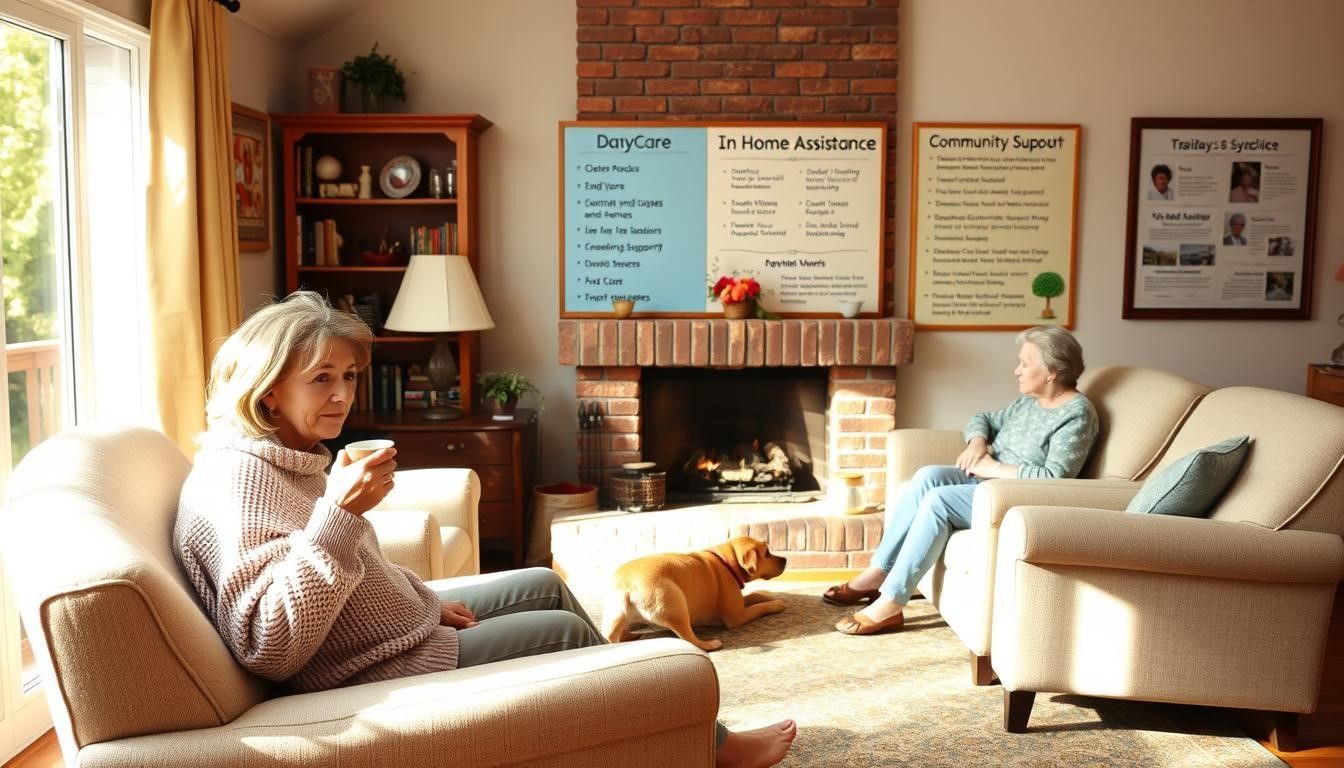Essential Self-Care Tips for Caregiver Mental Health During Stress
Caring for others can be a rewarding experience, but it also comes with unique challenges that can impact one's own wellbeing. Caregivers often put others first, neglecting their own
mental health in the process.

National Stress Awareness Day serves as a timely reminder of the importance of managing stress through consistent self-care practices. As caregivers navigate the demands of their role, it's essential to recognize that maintaining their own health is not selfish, but crucial for providing quality care.
Revitalizing Remedies offers support for caregivers experiencing
mental health challenges. This article will explore practical self-care strategies to help caregivers manage stress and maintain their wellbeing, especially during stressful periods like the holiday season.
Key Takeaways
- Understanding the importance of caregiver mental health
- Recognizing the role of National Stress Awareness Day
- Practical self-care tips for managing stress
- The significance of support networks for caregivers
- Strategies for maintaining mental wellbeing during challenging times
The Hidden Toll of Caregiving
The often-invisible labor of caregiving has profound effects on the health and well-being of those providing care. Caregivers, often family members or friends, shoulder the responsibility of caring for loved ones, managing their daily needs, and navigating complex healthcare systems.
Physical and Emotional Exhaustion
Caregiving is a demanding task that can lead to both
physical and emotional exhaustion. The constant vigilance required, coupled with the emotional strain of watching a loved one suffer, can result in chronic fatigue, sleep disruption, and neglected personal health needs. Caregivers frequently report symptoms like emotional and physical exhaustion, withdrawal from friends and
family, loss of interest in previously enjoyed activities, and changes in appetite or sleep patterns.
The Scope of Caregiver Stress in America
The scope of caregiver stress in America is substantial, with an estimated 44 million Americans aged 18 and older providing unpaid assistance and support to older people and adults with disabilities. The value of this unpaid labor is estimated to be at least $306 billion annually. Evidence shows that most caregivers are ill-prepared for their role and provide care with little or no support, yet more than one-third of caregivers continue to provide intense care to others while suffering from poor health themselves.
Recognizing these hidden tolls is the first step toward addressing
caregiver mental health needs. By understanding the challenges faced by caregivers, we can begin to provide the necessary support and resources to help them manage the stresses of
caregiving and maintain their own well-being.
Understanding Caregiver Burnout
Caregiving, while a labor of love, can take a significant toll on one's health, leading to burnout if not addressed. Burnout is a state of emotional, mental, and physical exhaustion that occurs when caregivers don't get the help they need or try to do more than they are able.
Common Signs and Symptoms
The signs and
symptoms
of caregiver burnout are similar to those of
stress and depression. They include emotional and physical exhaustion, withdrawal from friends, family, and other loved ones, loss of interest in activities previously enjoyed, and feelings of hopelessness.
When to Seek Professional Help
If you're experiencing persistent feelings of depression, anxiety, or thoughts of harming yourself or others, it's crucial to seek
professional help. Reaching out for support is a sign of strength, not weakness. The Suicide and Crisis Lifeline (988) is available for immediate support.
The Difference Between Stress and Burnout
While stress is temporary and tied to specific situations, burnout is a chronic state of depletion affecting multiple areas of life. Understanding this difference is key to addressing caregiver health effectively.
Recognizing the
signs of burnout early on can help caregivers take proactive steps to maintain their
health. By acknowledging the risks and taking action, caregivers can continue to provide quality care while preserving their own well-being.
Why Caregiver Mental Health Matters
Ensuring the mental wellbeing of caregivers is crucial for sustainable caregiving and overall family health. Caregivers play a vital role in supporting individuals with chronic or disabling conditions, but in doing so, they often sacrifice their own emotional and mental health.
Impact on Quality of Care
A caregiver's mental health directly affects the
quality of care they provide. Research indicates that caregivers experiencing burnout are less patient, less attentive, and more prone to errors, ultimately compromising the care recipient's wellbeing.
Long-term Health Consequences
The long-term health consequences for caregivers can be alarming. Studies show that caregivers are at a higher risk of depression, cardiovascular problems, weakened immune function, and even increased mortality rates. It's estimated that between 40 to 70% of caregivers exhibit clinically significant
symptoms
of depression.
Breaking the Cycle of Neglect
When caregivers continuously prioritize others' needs over their own, it leads to a cycle of neglect that deteriorates their health and further compromises their caregiving abilities. Breaking this cycle requires acknowledging that caregiver mental health is not a luxury but a necessity for sustainable caregiving. By addressing caregiver mental health, we not only benefit the caregiver but also improve outcomes for the care recipient through better quality care.
Healthcare systems are increasingly recognizing caregiver wellbeing as an essential component of comprehensive care plans. By doing so, they aim to provide a more holistic approach to care that supports both the caregiver and the recipient.
Recognizing Your Limits as a Caregiver
To provide effective care, caregivers must first understand and respect their own limitations and boundaries. Caregiver burnout happens when you devote the majority of your time, energy, and resources to taking care of others, neglecting your own physical, emotional, and mental health. This neglect can severely impact your ability to complete personal responsibilities and maintain your overall well-being.
Setting Realistic Expectations
Setting realistic expectations is crucial in preventing disappointment, guilt, and burnout. Caregivers should honestly assess their physical capabilities, emotional capacity, time constraints, and financial resources to determine what they can realistically accomplish. By doing so, caregivers can create a more sustainable caregiving plan that balances their responsibilities with their own needs.
Learning to Say No
Learning to say no to additional responsibilities when already overwhelmed is a vital skill for caregivers. This can be achieved by using specific language and approaches tailored to different situations. For instance, saying "I appreciate your request, but I'm currently at my limit" can help set boundaries without causing offense.
Accepting Imperfection
Embracing the concept of "good enough" caregiving can help alleviate the pressure to achieve impossible standards. Caregivers should recognize that it's okay to not do everything perfectly and that their best efforts are sufficient. This mindset helps in maintaining a healthy balance between caregiving responsibilities and personal well-being.
| Caregiver Challenges | Strategies for Success |
|---|---|
| Role Confusion | Establish clear boundaries between roles |
| Varied Expectations | Communicate needs and limitations clearly |
| Lack of Control | Prioritize tasks and focus on what's manageable |
Recognizing one's limits as a caregiver is not a sign of failure but a crucial step towards providing sustainable, quality care while maintaining personal health. By setting realistic expectations, learning to say no, and accepting imperfection, caregivers can ensure a healthier caregiving experience for themselves and their loved ones.
Daily Self-Care Practices for Caregivers
Self-care is not a luxury for caregivers; it's a necessity that can significantly impact their ability to provide quality care. Caregivers often face numerous challenges, from physical exhaustion to emotional strain, making daily self-care practices crucial for maintaining their overall health.
Micro-Moments of Mindfulness
Incorporating "micro-moments" of
mindfulness into a busy caregiving schedule can be transformative. Simple practices like deep breathing while waiting for appointments or practicing gratitude during daily routines can help reduce stress. These moments of mindfulness can be as simple as taking a few deep breaths, noticing the surroundings, or feeling the sensation of feet on the ground.
Physical Activity Adaptations
For caregivers with limited time and energy, physical activity adaptations can be a game-changer. Chair exercises that can be done while supervising a loved one or short movement breaks throughout the day can help maintain physical health. Even a short walk around the block can be beneficial.
Nutrition and Sleep Priorities
Nutrition and
sleep are critical components of caregiver self-care. Research shows that 63% of caregivers report worse eating habits, and many experience sleep disruption. Simple meal planning strategies can minimize preparation time while maximizing nutritional value. For example, preparing meals in advance or using a slow cooker can be effective. Additionally, practicing good sleep hygiene, such as maintaining a consistent sleep schedule and creating a sleep-friendly environment, can improve rest quality.
| Self-Care Practice | Benefit | Example |
|---|---|---|
| Mindfulness | Reduces stress | Deep breathing exercises |
| Physical Activity | Improves physical health | Chair exercises |
| Nutrition Planning | Enhances nutritional intake | Meal preparation in advance |
| Sleep Hygiene | Improves sleep quality | Consistent sleep schedule |
By incorporating these daily self-care
practices, caregivers can improve their overall
health and wellbeing, ultimately enhancing the quality of
care they provide.
Building Strong Support Systems
The journey of caregiving can be isolating, but it doesn't have to be, thanks to the various support systems available. Caregivers can tap into a network of family, friends, community organizations, and professional services to alleviate the burden.
Identifying Potential Support Resources
Caregivers can explore various types of
support resources, including
family members, friends, community organizations, faith communities, online groups, and professional services like those offered by Revitalizing Remedies. Identifying which people in your life might be willing and able to provide different types of
help, from emotional listening to practical assistance, is crucial.
How to Ask for and Accept Help
One of the common difficulties
caregivers face is asking for and accepting
help. Overcoming feelings of guilt, inadequacy, or the belief that no one else can provide proper care is essential. Using clear and specific language when requesting
help makes it easier for others to say yes.
Creating a Caregiver Circle
Creating a "caregiver circle" - a structured network of support with different people handling different aspects of care - can prevent any single person from becoming overwhelmed. Technology can facilitate coordination among support network members through shared calendars, care coordination apps, and virtual check-ins.
Building and maintaining
support systems is not a one-time effort but an ongoing process that requires regular communication and occasional adjustments as needs change. Professional
support from organizations like Revitalizing Remedies can complement informal
support networks, providing specialized expertise and respite care options.
Managing Emotional Responses to Caregiving
Caregiving is an emotionally complex experience that can evoke a wide range of feelings, from love and compassion to guilt and resentment. As caregivers navigate their roles, they often encounter a myriad of emotions that can be challenging to manage.
Dealing with Guilt and Resentment
Caregivers often experience feelings of guilt when they take time for themselves or feel they aren't doing enough. However, it's crucial to understand that self-care enables better caregiving. Strategies for managing guilt include acknowledging its presence, practicing self-compassion, and seeking support from others who understand the caregiving journey.
Resentment can also emerge, particularly when caregiving disrupts life plans or seems unappreciated. Healthy ways to process these emotions include expressing feelings through journaling or talking to a trusted friend or mental health professional.
Processing Grief and Loss
The concept of "anticipatory grief" is significant for caregivers of loved ones with progressive illnesses. This type of grief occurs while the care recipient is still alive, differing from post-death grief. Witnessing a loved one's suffering can add another emotional dimension, significantly impacting caregiver depression rates. Acknowledging and expressing these difficult emotions rather than suppressing them leads to better mental health outcomes.
"Caregivers must recognize that their emotional responses are valid and deserve attention. By doing so, they can foster a more authentic caregiving relationship."
Finding Meaning in the Caregiving Journey
Finding meaning and purpose in caregiving can buffer against burnout and depression. Techniques include focusing on the positive aspects of the caregiving experience, setting achievable goals, and seeking support from others. Practical outlets for emotional processing, such as support groups or therapy, can also provide caregivers with the tools they need to navigate their emotional responses effectively.
| Emotional Response | Management Strategy | Benefit |
|---|---|---|
| Guilt | Self-care and self-compassion | Better caregiving ability |
| Resentment | Journaling or talking to a professional | Emotional release |
| Grief | Acknowledging emotions and seeking support | Improved mental health |
Technology Tools and Resources for Caregivers
Modern caregivers have access to a wide range of technological tools designed to make their role easier and less stressful. These resources can be categorized into several key areas, each addressing different aspects of caregiving.
Apps for Stress Management
Caregivers can benefit from various mobile applications focused on stress management, including mindfulness apps and guided meditation tools. These apps offer quick relaxation exercises that can be used during brief breaks, providing much-needed respite. Some popular options include:
- Mindfulness apps like Headspace and Calm
- Guided meditation tools such as Insight Timer
- Relaxation exercises available on apps like Breethe
Online Support Communities
Online support communities provide a platform for caregivers to connect with others facing similar challenges. These communities allow caregivers to share experiences and receive emotional support without leaving their care recipients.
Telehealth services, including those offered by Revitalizing Remedies or by phone at
(201)-727-3241, can also provide mental health support.
Digital Organization Tools
Digital organization tools can significantly help caregivers manage medications, appointments, care tasks, and coordination with other family members or healthcare providers. Examples include:
- Medication management apps like Medisafe
- Care planning tools such as CareZone
- Coordination platforms like Lotsa Helping Hands
While technology offers numerous benefits, potential barriers such as cost concerns and technological literacy must be addressed. Caregivers should evaluate which technology solutions are most helpful for their specific situation and integrate them into their existing care routines.
Professional Support for Caregiver Mental Health
Caregivers often neglect their own mental health, but seeking professional support can be a game-changer.
Therapy Options for Caregivers
Caregivers have access to various therapy options, including
individual psychotherapy,
cognitive-behavioral therapy, and
specialized caregiver counseling programs. These therapies are designed to address the unique challenges faced by caregivers, providing them with the tools and strategies needed to manage stress and maintain their mental health.
Support Groups and Counseling
Support groups offer a unique benefit to caregivers, providing both
emotional validation and
practical advice from others who understand the challenges of caregiving. These groups create a safe space for caregivers to share their experiences and learn from others.
Innovative Treatments at Revitalizing Remedies
Revitalizing Remedies offers innovative treatments for caregivers experiencing depression or severe stress, including FDA-approved Spravato intranasal spray (esketamine) and non-drug NeuroStar TMS therapy. These treatments are part of a comprehensive approach that brings together doctors, nurse practitioners, counselors, and technicians to create personalized treatment plans.
Professional mental health support differs from informal support by offering
evidence-based interventions that can address clinical depression, anxiety, and other mental health conditions. Despite common barriers such as time constraints, cost concerns, and stigma, seeking professional help is crucial for caregivers.
Revitalizing Remedies, with its diverse team of mental health professionals, is committed to providing caregivers with the support they need. By offering advanced depression treatments, they provide unique options for caregivers who haven't responded to traditional approaches.
Creating Respite Care Plans
Respite care is not a luxury, but a necessity for caregivers to prevent burnout and ensure they can continue providing quality care. It involves planned, temporary relief for primary caregivers, allowing them to recharge and attend to their own needs.
Types of Respite Options
Various respite options are available to suit different needs. These include:
- In-home care services, where a professional caregiver comes to the home to care for the recipient.
- Adult day centers, providing social activities and care during the day.
- Short-term residential facilities, offering temporary stays.
- Informal arrangements with family and friends, which can be a more personal and flexible option.
Planning Regular Breaks
Consistency is key when planning respite breaks. Caregivers should aim for regular breaks, even if they are short. Daily mini-respites of 15-30 minutes can be as beneficial as longer, less frequent breaks. The goal is to create a routine that works for both the caregiver and the care recipient.
Overcoming Barriers to Respite
Common barriers to respite care include financial constraints, feelings of guilt, concerns about the quality of substitute care, and resistance from the care recipient. To overcome these, caregivers can explore financial assistance programs, discuss their feelings with support groups, thoroughly vet potential caregivers, and gradually introduce the care recipient to new caregivers.

By understanding the types of respite available, planning regular breaks, and addressing potential barriers, caregivers can create effective respite care plans. This not only benefits the caregiver but also enhances the quality of care provided to the recipient.
Navigating Holiday Stress as a Caregiver
For caregivers, the holiday season brings a mix of emotions and challenges, from managing family expectations to maintaining their own well-being. The additional stress of the holiday season can be overwhelming, but there are strategies to make this time more manageable.
Simplifying Holiday Traditions
One of the key ways to reduce holiday stress is by simplifying traditions. This can involve scaling back decorations, streamlining gift-giving, and focusing on meaningful activities rather than exhaustive preparations. By simplifying these aspects, caregivers can reduce their burden and create a more enjoyable experience for both themselves and their loved ones.
Managing Family Expectations
Managing family expectations is another crucial aspect of navigating holiday stress. Caregivers should communicate their limitations clearly and set boundaries with relatives who may not understand the realities of caregiving. This open communication can help in managing expectations and reducing potential conflicts.
Finding Joy in Modified Celebrations
Finding joy in modified celebrations is essential for caregivers. This can involve incorporating the care recipient into holiday preparations at their ability level, creating moments of connection rather than focusing solely on completing tasks. By adapting celebrations to accommodate the care recipient's needs, caregivers can preserve the spirit of the season while making it more sustainable.
It's also important to recognize that adapting holiday celebrations is not about diminishing their importance but about making them truly joyful rather than sources of additional stress. By prioritizing meaningful activities and simplifying traditions, caregivers can create a more enjoyable holiday experience.
| Strategies | Benefits |
|---|---|
| Simplifying holiday traditions | Reduces caregiver burden, creates a more enjoyable experience |
| Managing family expectations | Reduces potential conflicts, manages expectations |
| Incorporating care recipients into preparations | Creates moments of connection, preserves the spirit of the season |
By implementing these strategies, caregivers can better navigate the challenges of the holiday season, reducing
stress
and finding joy in modified celebrations.
Conclusion: Sustainable Caregiving Through Self-Care
The importance of self-care in caregiving cannot be overstated, as it directly impacts the quality of care provided. Throughout this article, we've explored various strategies to support caregivers in maintaining their mental health and overall health. By recognizing the signs of burnout, setting realistic expectations, and leveraging support systems, caregivers can provide care sustainably.
It's crucial to understand that self-care is not selfish; rather, it's an essential component of delivering quality care over time. Building strong support networks, both informal and professional, like those offered by Revitalizing Remedies, is vital. As the population ages, the issue of caregiver health is becoming a growing public health concern.
We encourage
caregivers to start with small, manageable
self-care steps and to reach out for
support when needed. By prioritizing their
mental health and overall
health,
caregivers can create a positive cycle that benefits both themselves and those they care for, even in the face of
illness. Let's work together towards
sustainable
caregiving practices.
Frequently Asked Questions About Self-Care Tips for Stressful Times
What are some common signs of caregiver burnout?
Common signs include physical and emotional exhaustion, decreased patience, and a sense of hopelessness. If you're experiencing these symptoms, it may be time to reassess your caregiving responsibilities and seek support.
How can I prioritize my own self-care as a caregiver?
Start by incorporating small moments of mindfulness into your daily routine, such as deep breathing exercises or short walks. You can also prioritize physical activity, healthy nutrition, and adequate sleep to help manage stress.
What resources are available to support family caregivers?
There are many resources available, including online support communities, respite care services, and counseling. You can also reach out to local organizations that provide assistance with caregiving tasks and emotional support.
How can I manage stress and anxiety as a caregiver?
Try using stress management techniques such as meditation, yoga, or journaling. You can also seek support from loved ones, support groups, or mental health professionals to help cope with the emotional demands of caregiving.
What are some ways to maintain a sense of compassion while caregiving?
Practicing self-compassion and acknowledging your own limitations can help you maintain a sense of compassion for the person you're caring for. You can also try to focus on the positive aspects of your caregiving experience and find meaning in the journey.
How can I ask for help as a caregiver?
Start by identifying your specific needs and reaching out to loved ones, friends, or support groups for assistance. You can also consider hiring professional caregivers or seeking respite care services to give you a break.
What are some digital tools that can support caregivers?
There are many digital tools available, including apps for stress management, online support communities, and digital organization tools. These can help you stay organized, manage stress, and connect with others who are going through similar experiences.









